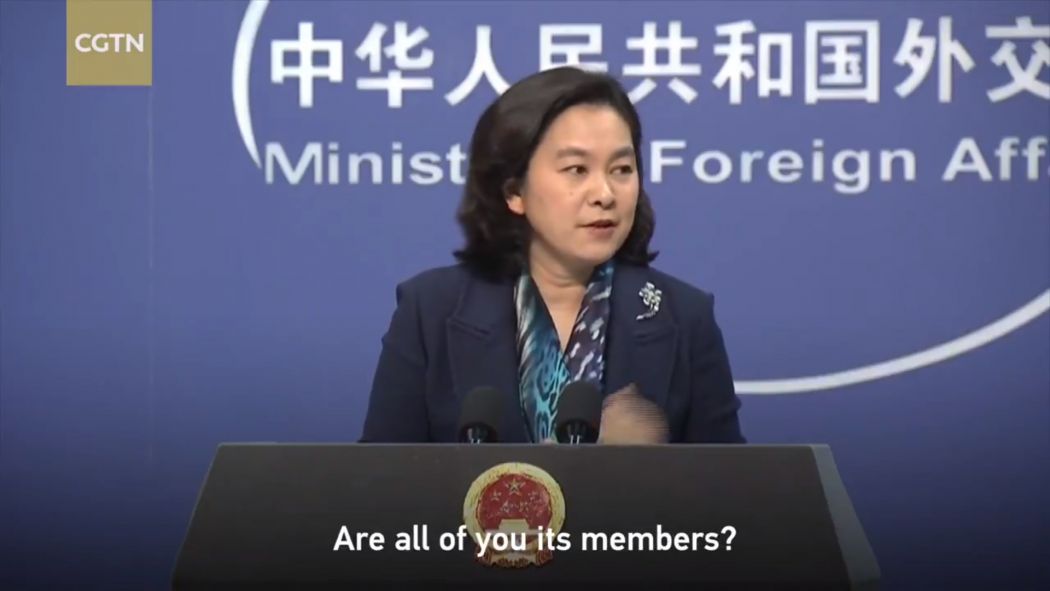A spokesperson for China’s foreign ministry has generated considerable online discussion after she responded to a survey of foreign journalists by conducting an informal poll of her own.
The Foreign Correspondents’ Club of China (FCCC) released its annual report this week, which concluded that the Chinese government had intensified its efforts to restrict and intimidate foreign journalists.

During a regular press conference this week, Ministry of Foreign Affairs Spokesperson Hua Chunying was asked about the report. She said that she had not seen it, but questioned the club’s credibility and went on to ask reporters present whether they agreed with the FCCC’s findings.
Chinese Foreign Ministry: Allegations by foreign journalists’ body “unreasonable” pic.twitter.com/Mnja8N3qCx
— CGTN (@CGTNOfficial) January 31, 2018
When no-one spoke, she said: “Then, you can tell the FCCC that foreign journalists present here today do not agree with its report’s conclusion, so it has in no way reflected the genuine opinion of almost 600 foreign journalists stationed in China,” and added that China will continue to assist and facilitate the work of foreign journalists as always.
Her response generated a flurry of reactions from foreign journalists on Twitter, as well as a triumphant article from state tabloid The Global Times celebrating her reaction. Communist Party mouthpiece the People’s Daily also wrote an article on her statement, saying Hua “showed her wit again” while responding to the “false report.”
Bizarre intimidation of reporters in MOFA briefing re @fccchina report: https://t.co/00hSjQFYAm pic.twitter.com/CdaqTbJpJY
— 𝕛𝕒𝕞𝕖𝕤 𝕘𝕣𝕚𝕗𝕗𝕚𝕥𝕙𝕤 🇭🇰🏴 (@jgriffiths) February 1, 2018
The Guardian’s Beijing Bureau Chief Tom Phillips responded by saying: “This is how Chinese gov responds to report accusing it of trying to browbeat foreign correspondents….!”
China Correspondent for Agence France-Presse Rebecca Davis said it was a “doozy of a MOFA response” and “low-grade brainwashing.”
+ some low-grade brainwashing: “I would like to ask all of you here, how do you find the working environment in China? You’re not saying anything, so I think you agree with my POV. You do not agree with the FCCC’s position.” #PressFreedomwithChineseCharacteristics
— Rebecca Davis (@rebeccaludavis) January 30, 2018
According to Associated Press journalist Gerry Shih, Hua has used similar tactics before.
At the next regular press conference on Thursday, a journalist from Japanese newspaper Sankei Shimbun confronted Hua about her statement.
According to a transcript released by the ministry, he told her: “On [January 30] you asked for a show of hands if any reporter in the room agreed with the contents of the report. The thing is that no reporter from Sankei Shimbun participated in the press conference on that day. Now, I am here and I want to say that I agree with that report. Because we have personally experienced some of the situations mentioned in it, and we also expressed our hope that the Chinese side should make some improvements. This is our position on this issue.”
Hua responded: “I wonder how many of the nearly 600 foreign journalists in China joined the FCCC. You said you agreed with the report, then I assume you are one of its members. I’d like to ask you a few questions. Why other media haven’t met the problem you mentioned? Why does Sankei Shimbun feel that way? Don’t you think it is how you behave sometimes that needs to be reflected upon? I believe, when the majority of foreign journalists and press can carry out their work and coverage smoothly in China, but you Sankei Shimbun alone has met problems, then you yourself need to do some self-reflection and self-examination.”
She then added that all foreign journalists “are our friends” and expressed hope that they will present a “real, multi-dimensional, and comprehensive” China.
“We welcome and support all your positive efforts to that end.”
In response, the BBC’s China correspondent Stephen McDonell offered to buy the Sankei Shimbun journalist a drink.
This Japanese journo from @Sankei_news should not have to put his hand in his pocket all year to buy a beer… my shout first mate: drink of your choice! 😉 https://t.co/HaLPjFpEyL
— Stephen McDonell (@StephenMcDonell) February 2, 2018
The FCCC report was based on a survey completed by 117 out of 218 of the club’s correspondent members.
